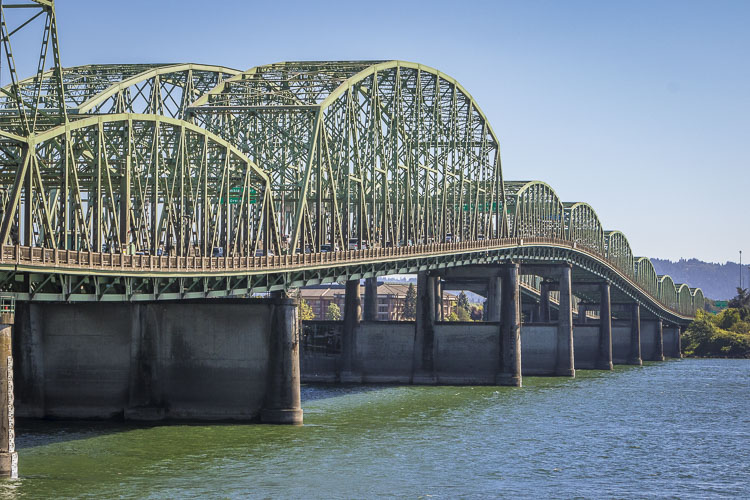
Councilors plan to vote on a resolution addressing Oregon’s variable rate tolls at Nov. 1 meeting
Members of the Clark County Council are preparing to take a vote on a resolution addressing Oregon’s plans to place “variable rate’’ tolls on the Interstate Bridge as well as on stretches of I-5 and I-205 in Oregon.
The Clark County Council has produced a “white paper” that addresses the tolling issue. Members of the council had the first reading of the resolution at Wednesday’s Council Time session and the second reading is scheduled for Wed., Oct. 26. The councilors are asking for public comment and they expect to vote on the resolution at their Nov. 1 meeting.

Councilor Dick Rylander represents the Clark County Council on the 25-member Regional Toll Advisory Committee (RTAC), which was established by the Oregon Department of Transportation (ODOT). ODOT officials met in August to consider the impact of tolling on the Portland metro area. Rylander worked with county staff to create the white paper on behalf of the County Council following earlier discussions regarding the Interstate Bridge Replacement and tolling in general.
“If we don’t take a stand, then the only representation on that (RTAC) committee for Clark County residents will be the city of Vancouver and the city of Vancouver has been supportive of tolls and light rail,’’ Rylander said. “I believe the vast majority of Clark County citizens have no interest in tolls. We need to stand up and speak on their behalf. We need to be on the record.’’
An estimated 75,000 Clark County residents work and pay income taxes in Oregon. Those citizens make up a sizable number of the 300,000 vehicles traveling on either I-5 or I-205 each day.
“I was asked to represent the County Council until the end of the year,’’ said Rylander, who was appointed earlier this year by Gov. Jay Inslee to fill a vacant seat on the Clark County Council. He filed for election to that District 5 seat but was not one of the two candidates (Don Benton and Sue Marshall) who advanced from the August primary election to the Nov. 8 general election. “I’m speaking up because I want the public to be heard. I want their position to be acknowledged and for it to be on the record.’’
And that position, essentially, boils down to the fact that there is no sunset clause on Oregon’s tolling plan, which is also not project specific.
“That to me is nuts,’’ Rylander said. “That is why I believe we need to strongly take a position that unless any toll packages are project specific and time limited, then they shouldn’t even be considered. If they are project specific and time limited, then we should consider them but the voters should still be able to say ‘yes’ or ‘no.’ Unless they can show the people of Clark County what the benefits are in tolling then we stand against it.’’
The summary of the white paper states “the tolling system, as proposed, places unreasonable and inappropriate burden on Washington residents.” This would cause significant financial harm to those working in Oregon, noting $325 million in Oregon income taxes were paid in 2020 by Clark County residents.
The paper notes that Oregon and Washington Transportation Commissions will actually set the tolling rates, and that both are considering some form of a “low income” tolling program “including exemptions and discounts.” The paper notes a “mobility pricing” program also being factored in that might charge people to drive on other roads.
The county mentions the tolls are proposed and being promoted for multiple reasons. They include saving travel time, funding critical maintenance and improvement, tolling will be an economic growth engine, and tolling will be beneficial to the environment. Concerns with the programs include “double tolling on I-5” (one for the bridge and another for driving the freeway), concerns with mobility pricing, and the cost of collection.
Rylander said that at the first reading, there were very few changes made by the five councilors. He also reported that he believed there was unanimous support among the councilors for the resolution.
Rylander did admit that, other than having a seat on the RTAC Committee, the County Council has very little power with which to fight Oregon’s tolling plan. Yet, he strongly feels the statement needs to be made and the citizens’ voices need to be heard.
“It strikes me as unbelievable that they want to tax us up the wazoo for everything and they want to do it 24/7,’’ Rylander said. “It has morphed into this monster.’’
Rylander also pointed out that in addition to the fact that the tolling plan isn’t project specific and without a given timeframe, the tolls are still unknown. During the Columbia River Crossing (CRC) debate a decade ago, it was estimated that tolls would be $8 for using just the replaced Interstate Bridge. Tolls would pay for approximately $1.5 billion in borrowed money as part of the $3.5 billion CRC project.
Rylander also pointed out that the cost of collecting the tolls was very expensive. For example, in Seattle on I-405 and SR167, the cost of collecting toll revenues ran 43 percent prior to the pandemic. In 2021, the cost of collection increased to 68 percent on the I-405/SR167 system.
The County Council discussion notes that with only two bridges across the Columbia River, the “double tolls” on I-5 are likely to increase traffic diversion on SR-14 and on I-205, which are already congested.
Citizens are encouraged to study the proposal and provide input and comments to the Clark County Council over the next two weeks. They can offer in-person comments at the regular Tuesday council meetings, or via email to individual county councilors.
Also read:
- IBR only has single firm interested in managing the project to replace I-5 BridgeRep. John Ley reports on serious concerns with the I-5 Bridge replacement project, including limited contractor interest, rising tolls, and a 15-year timeline.
- Busy pavement season ahead on Vancouver streetsThe city of Vancouver is set to repave and preserve 76 lane miles across 20 neighborhoods in summer 2025, with ADA upgrades and community notices throughout.
- State representative: Expect sticker shock when Interstate Bridge project officials reveal price, tolling plansAt a town hall in Battle Ground, Rep. John Ley warned of major cost increases and tolling burdens tied to the Interstate Bridge replacement project.
- Opinion: Washington state lawmakers increase the cost of driving – againBob Pishue of Mountain States Policy Center argues that new vehicle and fuel taxes in Washington will raise driving costs while diverting funds away from roads.
- Overnight full closure of I-5 near Woodland for bridge inspection, May 6WSDOT will fully close southbound I-5 near Woodland overnight on Tuesday, May 6 for a bridge inspection using a chain drag test.










Thank you to Dick Rylander for his faithful representation of the people of Clark County!
This is an excellent article. But there is much, much more to the discussion regarding TOLLING.
The state of Washington has FIVE separate tolling facilities. During the pandemic lockdowns, the state legislature was required to take other taxpayer money and bail out the tolling program, because they FAILED to raise enough money to cover their “cost of collection”.
Recently, the Washington State Transportation Commission reported that the SR-99 tunnel tolling program in Seattle (the Big Bertha tunnel) is under water, not raising enough money to cover their financial obligations. Furthermore, they expect it will need additional taxpayer money for THIRTY YEARS!
In Oregon, citizens are now collecting signatures for IP-4, which will require a “Vote Before Tolls” can be placed on any Oregon highway. Check out their website at https://votebeforetolls.org/ to learn more and help your friends in Oregon help us.
Excellent information the public might never know without your diligent research. Thank you.
The Council passed (5-0) the “No Tolls” resolution on Nov 1st. Here’s a link to the documents as well as the video from the meeting (start: 27 min)
I-5 Interstate Bridge Replacement Program | Clark County (wa.gov)
At a cost of 68 cents out of every dollar paid in tolls just to collect the tolls, that is a horrible deal for freight, commercial vehicles, visitors, and commuters, yet a fantastic deal for the tolling company. Public projects should make the public benefit as top priority, keeping costs down.
According to a post by Cascade Policy Institute
“Tolls are coming to the I-5 and I-205 bridges, and they’re coming more quickly than you would think.
Earlier this month, the Oregon Transportation Commission circulated a memo with an update on the Interstate Bridge Replacement Program (IBR). That memo declared, “Tolling would begin in late 2025 to early 2026.” In a slideshow to the commission, one of the slides projected, “I-205 tolling launches by the end of 2024.”…
The IBR will provide only a “marginal increase in auto capacity,” increase travel times, and charge tolls for the privilege of crossing both the new bridge and the I-205 bridge.”
In Clark County 2012, voters in every city in Clark County and the county area allowed to vote rejected the CTRAN proposition to raise taxes to extend Portland TriMet Max light rail into Clark County. In 2013, a county-wide vote was held, and voters advised the Clark County Council that citizens insisted on a vote on light rail prior to any funds being spent on it. Kudos to Councilor Rylander for standing up for the residents of Clark County and a public vote on light rail in Clark County, WA.
Tolling will affect every citizen living in our area and should be presented to the public voters.
It seems after all the years of discussing details with waisted time, energy and loss of finances, we should have had every detail worked out perfectly. It’s no wonder voters are skeptical this project can proceed without major problems.
Many thanks to councilor Rylander regarding input from the voters of Clark County who will be impacted by this huge project.
sharon
As a small business owner of Clark County for 34 years. I agree with this statement. To add collection fee’s to construction costs of today is a horrible idea. Once they start collecting in this manor. It will never go away!
When you basically have a socialist government, they can Never tax the people enough to pay for all the government programs…
The solution is a smaller government. That government which governs least, governs best.
Keith
Leave the I-5 bridges alone and build MORE bridges. Replacing (and tolling) the functioning bridges will not lessen the load on I-5 near Swan Island or on I-405 near Hwy26. Build us new bridges and get Oregon to upgrade I-84 through Portland. We could use another byway like I-205 and we could use another bridge from the Camas area to the Gresham area. Ridgefield to Hillsboro? Salmon Creek to Cornelius Pass?